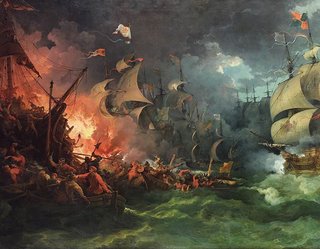BLACK IRISHMAN
 When I lived in Spain back in the 70s I was amazed to see, every now and then, someone who looked very much like me or a relative of mine. I was told there that, as one of the so-called "Black Irish" (black hair, blue eyes, pale skin) I was probably a descendant of one of the survivors of the Spanish Armada, many ships of which had been wrecked upon the shores of Ireland.
When I lived in Spain back in the 70s I was amazed to see, every now and then, someone who looked very much like me or a relative of mine. I was told there that, as one of the so-called "Black Irish" (black hair, blue eyes, pale skin) I was probably a descendant of one of the survivors of the Spanish Armada, many ships of which had been wrecked upon the shores of Ireland.Decades later in Japan, via the internet I found out it was more likely that Celtic ancestors from the Iberian Peninsula had, many millennia earlier, settled in what later became Ireland, and that the few Spaniards who had managed to survive the wreckage of the Armada and make it to shore in Ireland had been stripped and slaughtered right there on the beach or were later caught by the English or their allies and executed. Very few escaped alive, and likely none remained in Ireland.
In that connection, via the rootsweb.com ny-irish mailing list, I came upon this astonishing first-hand tale of that very event:
Captain Cuellar's Adventures in Connacht and Ulster (Author: Francisco de Cuellar)
Francisco de Cuellar was aboard the last group of Armada ships wrecked in Ireland, on 25 September 1588.
As a sample, his description of the Irish he encountered in the region of the MacClancy clan:
"The custom of these savages is to live as the brute beasts among the mountains, which are very rugged in that part of Ireland where we lost ourselves. They live in huts made of straw. The men are all large bodied, and of handsome features and limbs; and as active as the roe-deer. They do not eat oftener than once a day, and this is at night; and that which they usually eat is butter with oaten bread. They drink sour milk, for they have no other drink; they don't drink water, although it is the best in the world. On feast days they eat some flesh half-cooked, without bread or salt, as that is their custom. They clothe themselves, according to their habit, with tight trousers and short loose coats of very coarse goat's hair. They cover themselves with blankets, and wear their hair down to their eyes. They are great walkers, and inured to toil. They carry on perpetual war with the English, who here keep garrison for the Queen, from whom they defend themselves, and do not let them enter their territory, which is subject to inundation, and marshy. That district extends for more than forty leagues in length and breadth. The chief inclination of these people is to be robbers, and to plunder each other; so that no day passes without a call to arms among them. For the people in one village becoming aware that in another there are cattle, or other effects, they immediately come armed in the night, and ‘go Santiago’ (attack), and kill one another, and the English from the garrisons, getting to know who had taken, and robbed, most cattle, then come down upon them, and carry away the plunder. They have, therefore, no other remedy but to withdraw themselves to the mountains, with their women and cattle; for they possess no other property, nor more moveables nor clothing. They sleep upon the ground, on rushes, newly cut and full of water and ice. The most of the women are very beautiful, but badly dressed (got up). They do not wear more than a chemise, and a blanket, with which they cover themselves, and a linen cloth, much doubled, over the head, and tied in front. They are great workers and housekeepers, after their fashion. These people call themselves Christians. Mass is said among them, and regulated according to the orders of the Church of Rome. The great majority of their churches, monasteries, and hermitages, have been demolished by the hands of the English, who are in garrison, and of those natives who have joined them, and are as bad as they. In short, in this kingdom there is neither justice nor right, and everyone does what he pleases."
Fascinating, reading of the savagery and kindness of 500 years ago, that got us to this day...
CELT, the Corpus of Electronic Texts, Online Resource for Irish history, literature and politics, the source of this tale, brings tears to Irish eyes.
Now there is justice, now there is right.


















No comments:
Post a Comment